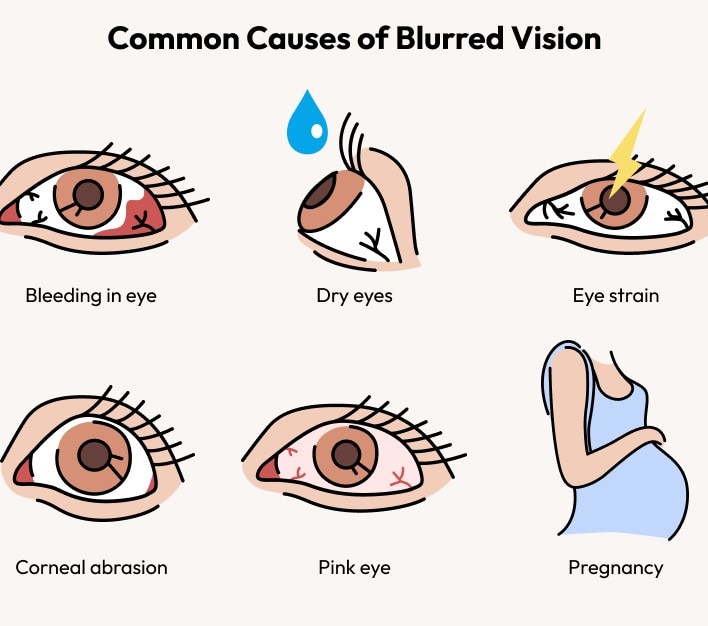In the EBD Blog
Reviewed by Thomas Stokkermans, OD, PhD on June 23, 2023
What causes blurred vision? Well, that’s a loaded question. Thankfully, for most people, the cause of blurry vision is often having a refractive error such as nearsightedness (myopia), farsightedness (hyperopia), or astigmatism — each of which can cause images to appear out of focus.
People over the age of 40 also experience a loss of near focusing ability called presbyopia (or age-related farsightedness). This makes it difficult to read menus, text messages, and other fine print.
In most of these cases, wearing glasses or contact lenses prescribed by your eye doctor is a simple and easy solution that will allow you to see better. But if glasses or contacts aren’t your thing, you may be eligible to have refractive surgery like LASIK performed to improve your vision.
But blurry vision is not always a simple issue. “Blurry eyes,” hazy vision or cloudy vision may be signs of an underlying health problem. It’s especially important to visit your eye doctor if you experience sudden vision changes or notice one eye becoming blurry when it normally isn’t.
Causes of blurred vision in these instances can be brought on by a number of more serious eye conditions or as a result of health conditions that affect the entire body.
Which Eye Conditions Cause Blurred Vision?
Some eye problems that cause blurred vision include: * Refractive error, such as astigmatism, myopia, or hyperopia * Dry eye * Eye injury * Eye infection * Eye fatigue, perhaps due to an outdated glasses prescription or a contact lens that is overworn or out of focus * Digital eye strain * Diabetic retinopathy * Macular edema * Ocular migraine * Glaucoma * Retinal detachment * Inflammation in or around the eye * Tumor * Cataracts * Age-related macular degeneration (AMD) * Recovery from eye surgery
Blurry peripheral vision could be a sign of glaucoma, retinal detachment, inflammation, or even a tumor, among other things.
A single blurry spot in your vision could be something as simple as a harmless floater. But it could also be a sign of something more serious, such as macular degeneration, edema (swelling), or bleeding in the back of your eye.
An abrupt vision change can be cause for worry. For example, developing sudden blurry vision in only one eye could be a sign of a nerve problem or even a stroke. If you experience this particular eye problem, get checked out as soon as possible.
Other conditions, including retinal detachment and corneal abrasion, can also cause sudden blurry vision. In some cases, this blurriness may be accompanied by double vision and light sensitivity.
Which Health Conditions Cause Blurred Vision?
- In addition to eye disease, several systemic conditions can affect your vision and overall eye health. These can include:
- Diabetes
- Hypertension
- Stroke
- Nerve problems
- Pregnancy
If you experience a concerning symptom, such as sudden blurred vision in only one eye, or notice something that doesn’t seem right about your vision, don’t wait to see your eye doctor. Don’t worry — your doctor will never chastise you for coming in to have a problem checked out, no matter what it turns out to be.
Regular eye exams are important too, even if you don’t have a noticeable vision problem. Some systemic diseases, such as hypertension and diabetes, are often first discovered during a routine eye exam. It’s astonishing how much your eyes can reveal about your overall health!
With all that said, it should come as a relief to know that in most cases, a simple vision prescription from your eye doctor is enough to get your sight back to normal. Prescription glasses and contacts are designed and fitted to provide you with clear, comfortable vision at all distances.
If you ever experience sudden blurry vision, dramatic changes to your vision, or feel like something is amiss, don’t hesitate to have your eyes examined. The eyes truly are the windows to the soul — and your overall health!
SOURCES
1. What causes sudden blurry vision? All About Vision. January 2021.
2. Blurry vision in one eye or both eyes. All About Vision. April 2021.
3. Injury to the eye. JAMA. August 2018.
4. Common eye infections. Australian Prescriber. June 2018.







